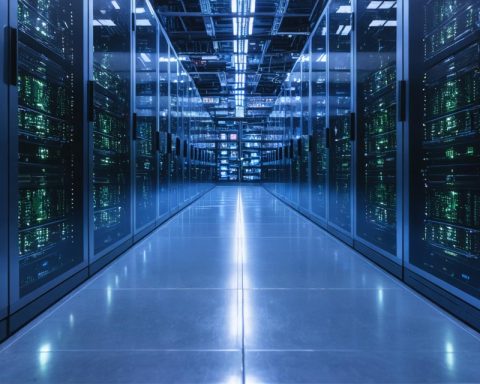Examining the Ripple Effects of Export Controls
In a surprising twist, the U.S. administration’s proposal for strict global export controls on AI chips is shaking up the tech industry, particularly affecting giants like Nvidia and AMD. These restrictions aim to limit the dissemination of advanced technologies to countries like China and Russia, purportedly boosting national security. However, this announcement has already triggered significant volatility in tech markets.
Impact on Nvidia and AMD Stocks
The proposed measures have sent Nvidia’s stock plunging by over 4%, marking a value of $134.4, while AMD saw an even starker drop of nearly 6%, reaching $114.6. These declines underscore investor anxiety about the potential impact on future sales and profit margins in globally pivotal markets. Both companies’ operations are heavily dependent on international AI and GPU transactions, which face disruptions under these new guidelines.
Financial Strategy Overhaul
Major financial institutions are re-evaluating their positions on tech titans like AMD, with Goldman Sachs lowering its rating from “buy” to “neutral” and adjusting its target price to $129. This recalibration reflects the industry’s growing concern over the uncertain path ahead as firms grapple with the implications of enforced regulatory changes.
Navigating the New Era of Tech Geopolitics
These developments highlight the intricate geopolitical tension permeating the global tech markets. As nations reconsider the reach of their technological advancements, companies must navigate intricate compliance landscapes. Analysts anticipate a transitional period where firms might pivot to regions with less stringent controls, all while lobbying for adjustments to the proposed restrictions that could hinder current operations.
This unfolding scenario heralds a transformative era for tech companies, potentially reshuffling the global market hierarchy.
The Future of Global Tech Amidst New Export Controls: Environmental, Economic, and Human Implications
The U.S. administration’s recent proposal to impose strict export controls on AI chips has sent shockwaves through the tech industry, particularly impacting major players like Nvidia and AMD. These measures aim to curb the distribution of advanced technologies to nations such as China and Russia, with the primary goal of bolstering national security. However, this policy is already causing significant disruption in tech markets, underscoring the profound implications for the environment, humanity, and the global economy.
Economic Tremors and Environmental Implications
The immediate economic impact of these proposed export controls is evident in the sharp declines in Nvidia and AMD’s stock prices. Investor anxiety stems from fears over disrupted sales in international markets, particularly those deemed pivotal for future growth. The restrictions threaten to undercut profits not only for these tech giants but also for the broader supply chain, which involves numerous suppliers and partners worldwide.
From an environmental perspective, the constrained flow of AI and GPU technologies could impede the development of energy-efficient computing solutions. AI technologies are foundational in optimizing resource management, predicting environmental changes, and enhancing sustainable practices. With restricted access to advanced AI chips, technology-dependent initiatives targeting sustainability and environmental protection might witness a slowdown, potentially derailing efforts to combat climate change and manage natural resources effectively.
Human Elements and Global Tech Innovation
On a human level, the unfolding scenario of tech geopolitics heralds a complex nexus of opportunities and challenges. Limitations on technological dissemination could hinder collaborative international research efforts and stifle innovation streams that thrive on the free exchange of ideas and technologies. This could ultimately impact global problem-solving capabilities, particularly in areas where AI advancements are vital, such as healthcare, disaster response, and infrastructure development.
Yet, as companies navigate this intricate compliance landscape, there emerges a potential for diversification and innovation through the pivot to markets with more relaxed regulations. This transitional period might spur unexpected advancements as firms are compelled to innovate within new constraints, potentially leading to breakthroughs in AI utilization and application.
Vision for the Future of Humanity
The proposed export controls signify more than just a geopolitical maneuver; they represent a pivotal moment in the relationship between technology, international policy, and humanity’s future direction. The evolving landscape demands a careful balance between ensuring security and fostering innovation. As nations navigate these complexities, the choices made today will shape the trajectory of technological progress and its integration into society.
These developments prompt critical reflections on how future policies can harmonize security objectives with the global imperative for sustainable and inclusive technological advancement. Ultimately, the path forward will require dialogue and cooperation among international stakeholders to ensure that humanity can harness the full potential of technological innovation to address global challenges and enhance quality of life worldwide.
Unveiling the Future: How AI Chip Export Controls are Redrawing the Global Tech Landscape
The recent proposal by the U.S. administration to impose stringent global export controls on AI chips has sparked considerable changes within the technology sector. While the primary goal is to enhance national security by restricting technology exports to countries like China and Russia, these measures have far-reaching implications for major tech players and the industry at large.
Pros and Cons of AI Chip Export Controls
The U.S. administration’s proposed export controls aim to safeguard national security by limiting advanced technology access to potential adversaries. On the positive side, proponents argue that these measures could lead to a more secure technological environment, reducing the risk of sensitive innovations falling into unfriendly hands. However, critics highlight significant downsides, including potential stifling of market growth and innovation, as companies face restrictive barriers to key global markets.
Emerging Trends and Market Predictiveness
The introduction of these controls has already demonstrated its profound impact on tech markets, with notable fluctuations in stock prices, such as the substantial dips experienced by Nvidia and AMD. This development indicates a trend where tech companies might increasingly seek alternative markets or focus on innovation that circumvents current constraints. Moreover, the regulatory environment is pushing firms to anticipate changes proactively, adjusting their strategies and product development to align with these new market realities.
Technological Innovation and Adaptation
As companies like Nvidia and AMD grapple with these changes, innovation remains a critical factor in maintaining competitive advantage. Tech firms are expected to invest in research and develop new products that can thrive despite export restrictions, potentially diverting focus away from previously pivotal international markets. This shift not only necessitates a dynamic response from corporations but also creates opportunities for emerging players in less regulated regions to gain prominence.
Navigating Geopolitical Challenges
Firms are now operating in an era where technology and geopolitics are deeply intertwined. The pressure to comply with varying international regulations requires robust compliance frameworks. Companies might leverage diplomatic channels or trade bodies to advocate for regulatory adjustments, aiming to secure operational flexibilities that ensure sustainable growth.
Predictions for the Future
Experts predict a reshaping of the global tech market hierarchy as companies adapt to these controls. It is expected that collaborations and partnerships across borders will become strategic necessities. Additionally, the tech industry might witness a resurgence in domestic markets, prompting increased investment in local resources and talent as a countermeasure to international constraints.
In conclusion, the ripple effects of proposed AI chip export controls are redefining the global tech landscape. Both challenges and opportunities lie ahead as the industry navigates this complex geopolitical terrain. For those interested in understanding the broader implications of these trends, more insights can be found through relevant sources.















